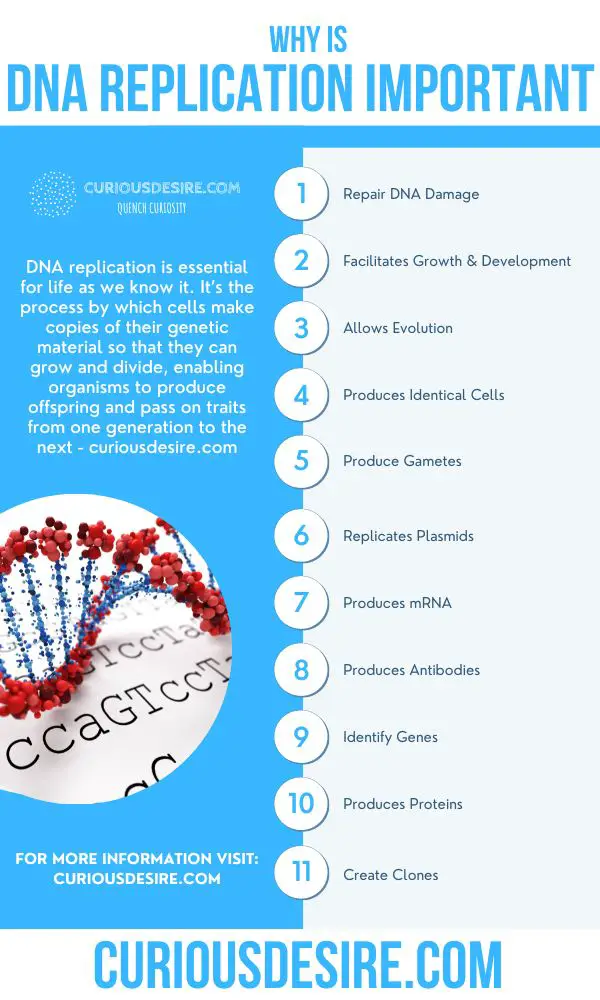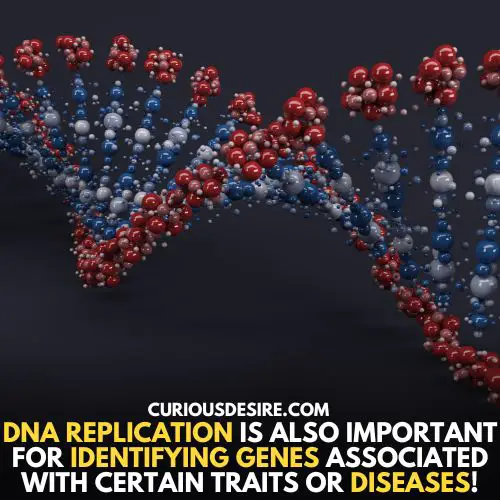DNA replication is essential for life as we know it. It’s the process by which cells make copies of their genetic material so that they can grow and divide, enabling organisms to produce offspring and pass on traits from one generation to the next.
But why exactly is DNA replication important? In this article, we’ll explore 19 reasons why is DNA replication important to life.
19 Benefits of DNA replication
DNA replication is the process by which a cell copies its genetic material so that it can divide and produce new cells. When DNA replicates, the double-stranded helix of DNA unwinds, and each strand serves as a template for the production of an identical new strand. This ensures that each daughter cell has a complete copy of the parent cell’s genetic information.

Here are 19 reasons why this complex yet vital biological process is critical for all living things.
1. It Helps To Repair DNA Damage
DNA damage can occur from a variety of factors, including UV radiation, certain chemicals, smoking, and more. Some environmental factors even have the ability to modify DNA structure directly.
In order to repair this damage, cells must replicate their DNA so that the damaged strand can be replaced with a correct copy of the original sequence. This ensures that the cell’s genetic material remains intact and can be passed on from one generation of cells to the next.

2. DNA Replication Facilitates Growth & Development
Cells must replicate their genes in order to grow, develop, and function as they should. DNA replication is the process by which cells make copies of their genetic material in order to make new cells. This process occurs when a double-stranded helix of DNA unwinds and each strand serves as a template for the production of an identical new strand.
This process is essential for the normal growth and development of an organism, as it allows cells to divide and multiply in order to produce offspring or for damaged cells to be replaced with healthy ones.
3. DNA Replication Allows Evolution
DNA replication is responsible for creating a wide variety of genetic diversity through mutations. Mutations occur when the copying process goes wrong and one nucleotide is replaced with another, resulting in a change in the sequence.
These changes can lead to new traits or adaptations that may be beneficial in certain environments. This helps organisms evolve and adapt over time, allowing them to survive in changing conditions.
4. DNA Replication Produces Identical Cells
DNA replication is essential for the survival of multicellular organisms, as it helps to ensure that all cells contain the same genetic information and can carry out the same functions.
This process is particularly important in eukaryotic cells, which have a nucleus containing DNA, as well as organelles such as mitochondria and chloroplasts that contain their own DNA.
By replicating their genetic material, cells can produce exact copies of themselves and remain faithful to the parent cell’s genotype.
5. DNA Replication Produce Gametes
In sexually reproducing organisms, the production of gametes—the reproductive cells that combine to create a new organism—requires DNA replication. This process ensures that each gamete contains a full set of genetic information, thereby creating an individual with an entirely unique genotype.
Through this process, each parent contributes half of their genetic material to the offspring, allowing them to possess a mix of traits from both parents. DNA replication is essential for the creation of these reproductive cells, allowing them to combine and form the basis of new life.
6. DNA Replication Replicates Plasmids
Plasmids are small, circular pieces of DNA that are found in bacteria and other microorganisms. Plasmids are essential for the transmission of genetic information between bacterial cells and are replicated using the same mechanisms as chromosomal DNA.
They contain genes that can be passed down from one generation to the next, allowing bacteria to adapt quickly to changing environments. Plasmids can also carry antibiotic-resistance genes, making them an important factor in the spread of antibiotic resistance.

7. DNA Replication Produces mRNA
DNA replication is a crucial process that occurs in all living organisms. It involves copying a strand of DNA, which is then used to create the mRNA molecules necessary for protein synthesis. DNA replication is essential for the production of messenger RNA (mRNA).
This process begins when an enzyme, known as DNA helicase, breaks the hydrogen bonds between the two strands of DNA and separates them into two single strands.
The single strands then serve as templates for the production of an identical new strand of DNA. This process is important for a variety of metabolic activities, including the production of proteins and cellular growth.
8. DNA Replication Produces tRNA
Transfer RNA (tRNA) molecules are essential for protein synthesis and their production also relies on DNA replication.
During this process of tRNA production, DNA replication is the first step. The two strands of DNA are separated by an enzyme known as DNA helicase, which breaks the hydrogen bonds between them. This enzyme then moves away from the part of the DNA that it has just opened in order to make space for the replication machinery to enter and begin copying the DNA.
After the two identical strands of DNA are created, they are used to create tRNA molecules. These molecules carry amino acids to the ribosomes and are, therefore, essential for the production of proteins.
9. It Produces Antibodies
DNA replication is an essential process that enables the body to produce antibodies, which are proteins that recognize and attack foreign particles. This process begins when an enzyme, known as DNA helicase, separates the two strands of DNA by breaking the hydrogen bonds between them.
The single strands then serve as templates for a new strand of DNA that is identical to the original. This process is important for producing antibodies, as it ensures that each newly produced antibody contains genetic information from both parents.
It also allows the body to produce a wide variety of antibodies, which can recognize and target different invading particles and pathogens.
10. It Helps to Identify Genes
DNA replication is also important for identifying genes associated with certain traits or diseases. By replicating DNA strands, scientists can use the process of recombinant DNA technology to identify the genetic sequence associated with a particular trait or disorder.
Through this process, scientists are able to take a specific gene or genes of interest and isolate and clone them. This allows them to study the gene’s structure, expression, and function in more detail.

11. DNA Replication Produce Proteins
Proteins play an important role in many aspects of cell functioning and development. They also provide structure to organisms and are responsible for a wide range of metabolic activities.
DNA replication is essential for the production of proteins, which are crucial for cell functioning and development. It involves copying a strand of DNA, which is then used as a template for the production of other molecules, such as proteins. This process begins when an enzyme known as DNA helicase separates the two strands of DNA and breaks the hydrogen bonds between them.
The single strands then serve as templates for the production of identical new strands of DNA.
The newly produced strands are then used to produce mRNA molecules, which are essential for protein synthesis. Finally, the mRNA molecules are translated into proteins by ribosomes.
12. It Helps To Create Clones
Cloning involves the replication of a single strand of DNA, which is then used to produce identical copies. This process has been employed for various purposes, such as creating copies of plants and animals that have genetic traits that are desirable for farming purposes or even medical research.
Human cloning has also been attempted in the past, though the ethical implications of such a procedure remain controversial.
The process of cloning begins with the separation of the two strands of DNA by an enzyme known as DNA helicase, which breaks the hydrogen bonds between them. The single strand then serves as a template for replicating identical copies, which can then be inserted into other organisms or used to create clones.
13. DNA Replication Produce Vaccines
Vaccines are created by replicating viral DNA in the laboratory. This process of replicating viral DNA in the laboratory allows scientists to create weakened versions of viruses which can then be used to create vaccines that help protect the body from infection.
By using this method, researchers are able to produce a vaccine which contains the same genetic information as the virus it is meant to protect against, but with certain genes disabled or weak so that they cannot cause illness.
To replicate the viral DNA, researchers use a process called PCR (polymerase chain reaction) which amplifies small amounts of DNA found in a sample. The amplified DNA is then used to produce weakened versions of the virus, which can be used to create vaccines.
14. It Aids to Study Evolutionary Relationships
DNA replication is also essential for studying evolutionary relationships between organisms. By comparing the DNA of different species, scientists can determine how closely related they are and trace their evolutionary history.

This process is known as comparative genomics and involves looking at the genetic similarities of different organisms and their evolutionary relationships. Scientists use DNA replication to compare DNA from a variety of sources, including fossils, ancient remains, as well as modern-day species.
By using this data, scientists can gain a better understanding of the evolution of living organisms and their evolutionary relationships with one another. This knowledge can then be used to develop new treatments for diseases or predict which species are at risk for extinction.
15. It Produces RNA Interference
RNA interference has been used in a number of research areas, including cancer biology and agriculture. It has also been used to develop new treatments for diseases such as HIV/AIDS and malaria. By manipulating the genetic material that encodes for specific proteins, scientists can control how much of the protein is produced or how it functions in a cell.
RNA interference (RNAi) is a process used to regulate gene expression through the use of small interfering RNAs (siRNAs). These molecules are created by replicating strands of DNA, which act as templates for the production of siRNAs that can target specific genes.
The replicated strands are then used as templates to synthesize siRNAs, which can then be used to regulate gene expression by either switching off or down-regulating certain genes.
16. It Creates Genetically Modified Organisms
DNA replication is also important for creating genetically modified organisms (GMOs). By replicating DNA strands, scientists are able to identify and manipulate specific genes in order to create organisms with desired characteristics.
This process, known as genetic engineering or genetic modification, involves inserting or deleting genes from the organism’s genome in order to achieve a certain outcome.

The process of gene engineering begins by isolating the desired gene and replicating it numerous times. The copies of the gene are then inserted into the organism’s genome, where they can produce their desired effect.
This process has been used to create a variety of genetically modified organisms, such as plants that are resistant to pests or bacteria that can produce useful medicines and vaccines. It is also used in medical research to develop new treatments for diseases.
17. DNA Replication Helps Fight Cancer
DNA replication is also essential for fighting cancer. By monitoring the replication of cancer-causing genes, doctors can identify new drugs and treatments that can target these genes and help stop the progression of the disease.
Through this process, researchers are able to compare healthy cells with cancerous cells in order to identify any genetic mutations or changes in gene expression levels that might be responsible for the disease.
18. DNA Replication Produces Pharmaceuticals
Pharmaceuticals are also created using DNA replication. By replicating strands of DNA, scientists can create drugs that are specifically tailored to target and treat specific diseases or conditions. This process is known as gene therapy and involves the use of recombinant DNA technology.
This technology allows scientists to isolate a particular gene sequence from an organism and replicate it in order to obtain the desired result.
Through gene therapy, scientists are able to develop treatments for various diseases or conditions and can even create drugs that target specific genetic mutations. This process not only allows for the creation of more effective treatments but also helps to eliminate adverse side effects associated with traditional pharmaceuticals.
19. It Helps Cells Respond to the Environment
Cell replication is also important for allowing cells to respond to changes in the environment. By replicating their DNA, cells can create different versions of proteins and other molecules that are better suited to a particular environment or situation. This allows organisms to adapt and survive
This variation allows species to evolve over time, adapting to environmental pressures and changes in their environment.
By understanding and harnessing the power of DNA replication, scientists are able to manipulate genetic material in order to create new drugs, treatments, and even organisms. DNA replication is thus a critical process in biology, allowing life to continue into the future.
Conclusion
In conclusion, DNA replication is essential for many biological processes, from the production of proteins to the identification of genes associated with traits or diseases. It is also important for creating clones and genetically modified organisms, as well as for fighting cancer and producing pharmaceuticals.
DNA replication is essential for understanding evolutionary relationships between species, producing tRNA molecules, creating antibodies, and helping to repair damaged DNA. Without this process, many of the things we see in nature today would not exist. Therefore, it is clear that DNA replication plays a critical role in the functioning of life on Earth.